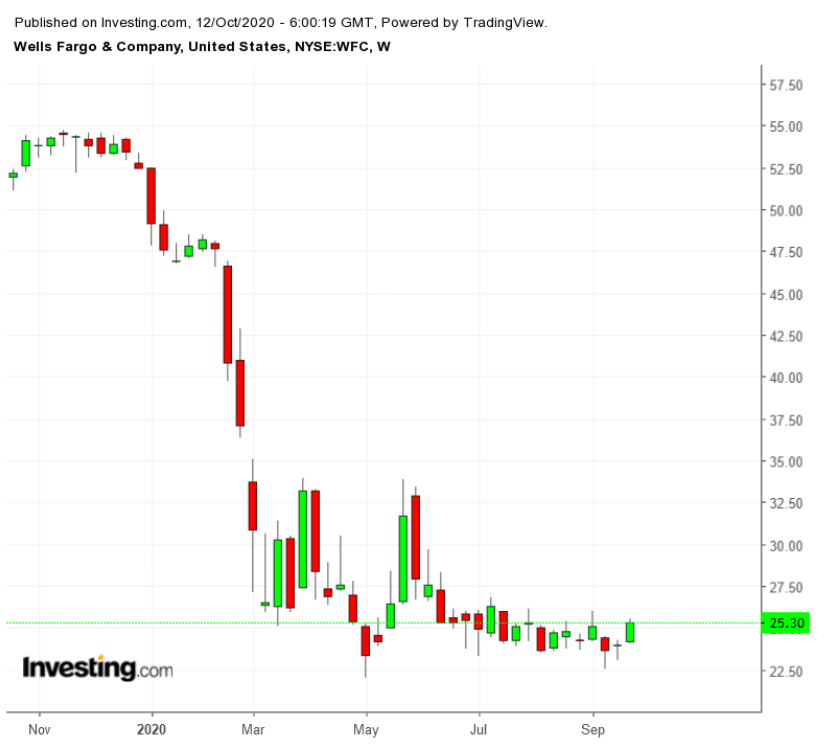With the Q3 2020 earnings season kicking off this week, results from top US banks may show they endured more pain from the pandemic which has hurt their lending businesses and forced them to set aside additional money for potential loan losses.
However, that lethal combination of shrinking lending and escalating loan losses have so far not played out the way many analysts had predicted. Indeed, the massive government stimulus already in circulation seems to be helping banks avoid the worst case scenario.
In both the first and second quarters, in order to brace for the expected tsunami of souring loans, some of the top US banks put aside additional cash, but with the pandemic uncertainty persisting, the necessary loan loss provisions needed remains unpredictable. A surge in new COVID-19 cases this month now threatens to further impair commerce at a time when the government and Congress are negotiating another stimulus package for consumers and businesses, though that effort appears once again to have stalled.
“We are in a completely unpredictable environment for which there are no models, no cycles to point to,” Citigroup (NYSE:C) Chief Executive Officer Michael Corbat told analysts in a Bloomberg report after its Q2 earnings release.
This uncertain situation continues to keep investors on the sidelines when it comes to bank stocks. The KBW Nasdaq Bank Index is down 30% this year, compared with a 7.6% gain for the broader S&P 500.
Dividend Uncertainty
Wells Fargo (NYSE:NYSE:WFC) is the year’s biggest loser among major banks, with shares tumbling 53%. The stock closed on Friday at $25.30

The lender is scheduled to report on Wednesday, Oct. 14, before the market opens. The consensus forecast calls for it to show a $0.44 per share loss on sales of $17.96 billion.
Along with swelling loan provisions, investors are also grappling with the uncertainty of future dividend payments by this and other lenders.
The Federal Reserve has extended through the rest of the year its unprecedented constraints on dividend payments and share buybacks for the biggest US banks. The limits are being extended because of ongoing “economic uncertainty from the coronavirus response” and the need for the banking industry to preserve capital, the Fed said in a statement last month.
The caps announced in June have restricted banks from increasing dividends above second quarter levels, and buybacks were banned. Those restrictions were less than the total elimination of dividends demanded by some Democratic lawmakers.
The bar on their payouts has disappointed lenders such as JPMorgan Chase & Co. (NYSE:JPM), which is keen to resume buybacks.
JPM, the powerhouse Wall Street commercial and investment bank will report third quarter earnings on Tuesday, Oct. 13, before the market open. Analysts are expecting $2.05 a share profit on sales of $27.72 billion.
During Q2, JPM set aside $10.47 billion for credit losses, more than anyone predicted. The amount exceeded its record $8.6 billion in loan-loss provisions from the beginning of 2009.
When it reports, investors will be looking for cues as to whether JPMorgan is close to the bottom of loan losses as the economy reopens and businesses try to get back on their feet. JPM stock closed on Friday at $101.20, down 27% for the year.
Despite the pressure on overall earnings, trading and underwriting are two areas of the banking business which are still thriving, helping some big lenders to weather the storm. JPMorgan saw a 79% surge in market revenue from a year ago in Q2 while investment banking fees jumped 91%.
Bottom Line
Given the depth of the current economic crisis and still raging pandemic, it’s unlikely that bank earnings will quickly recover from their slump. That said, banks are much better capitalized for the current downturn than they were during the 2008 Financial Crisis.
That strength is encouraging some investors to look favorably at some beaten-down bank stocks. For them, this weakness will be a buying opportunity.
